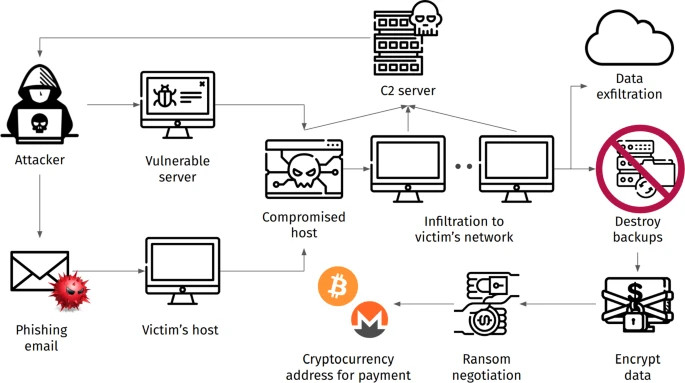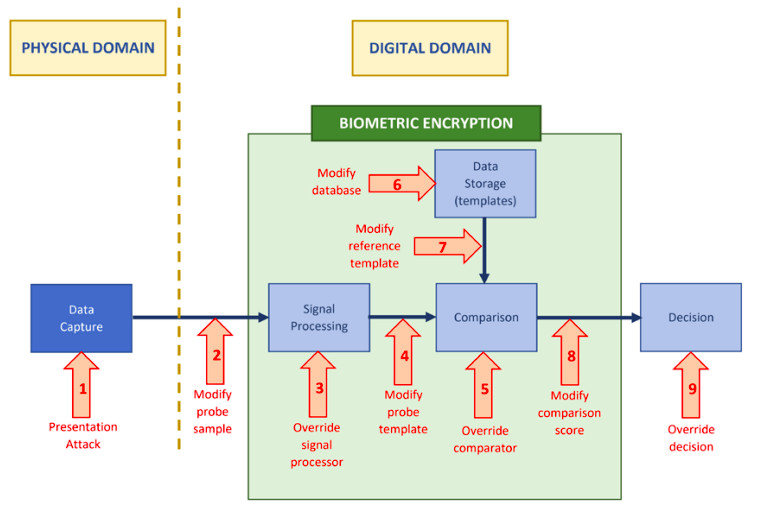Europol Alarms on Crypto Mining as Potential Cover for Money Laundering and Organized Crime


In Brief
Europol, the EU’s law enforcement body, has released its first comprehensive study on encryption, highlighting concerns about cryptocurrency mining being misused by illegal actors.
The European Union’s law enforcement body, Europol, has expressed worries about the cryptocurrency mining business being misused by illegal actors in its first comprehensive study on encryption. The 56-page study, which was written in conjunction with many EU agencies, examines new technologies and how they relate to encryption, offering a sobering analysis of the constantly changing difficulties that law enforcement investigations face.
The main claim made by Europol in its warnings is that various types of cryptocurrency mining have turned into a draw for a variety of illegal operations carried out by organized crime groups. The agency asserts that miners are being more frequently targeted by scam enterprises for reasons ranging from fronting unlawful revenues to laundering ill-gotten assets.
The document stated merely that mining rigs or farms had been used to launder money by purchasing cryptocurrency-mining equipment with earnings from illegal activities. Criminologists can continue to use mining businesses as a front for illegal gains, even in cases where such acquisitions were not lucrative.
The results clarify how the industrial size and resource-intensive character of mining may act as a mask to conceal the source of black money. Through the investment of pilfered money into mining installations, criminals may present their wealth as legitimate earnings from energy-intensive cryptocurrency minting. Profitability, however, doesn’t seem to be the main priority since Europol claims that some mining operations are only “a cover for illicit earnings”; this raises concerns that large-scale farms might serve as elaborate fronts for money laundering.
Crypto Mining as a ‘Cloak’ for Criminal Activity, According to Europol
Particularly concerning, according to the research, are mining pool schemes that purportedly developed into bold frauds that defrauded investors of “hundreds of millions of euros.” It mentions the well-known BitClub Network case as a classic example, in which con artists purportedly ran a Ponzi scheme and promised revenues through phony mining pools.
Additionally, according to Europol, botnets and malware that use “cryptojacking” code to take over computer resources and mine Bitcoin illegally are being aggressively targeted by law enforcement. “For over five years already, botnet mining or cryptojacking has been used by criminals to abuse victim’s bandwidth and processing power to mine cryptocurrencies,” according to the paper.
Although a large portion of the cryptocurrency community has long been aware of the issue of cryptojacking, which targets anything from cloud infrastructure to individual PCs, Europol’s study confirms that these schemes are still a real concern and need to be watched out for.
In the end, the agency presents cryptocurrency mining as a possible cover for a variety of illicit acts, ranging from straightforward fraud to money laundering. Its harsh evaluation conveys the idea that the mining environment is being used more and more by unscrupulous people and is becoming a new shelter for illegal income sources. However, mining is not the only cryptocurrency industry that has Europol’s attention and worry.
Report Flags Privacy Coins, Mixing Services as ‘Obfuscation’ Threats
Concerns about privacy-enhancing features in cryptocurrencies that might “complicate tracing” criminal cash for investigators are also expressed in the paper, which goes beyond mining.
It singles out privacy coins—coins designed with improved encryption to mask transactions like Grin, Zcash, and Monero as possible tools for money laundering. The paper notes that although Bitcoin’s dominance in criminal sectors has not been overshadowed by other privacy options, new advancements such as zero-knowledge proofs “can also obscure the visibility of cryptocurrency addresses, balances, and transactions.”

Photo: International Journal of Information Security
Europol is likewise cautious of tumbling or mixing services that are used to hide cryptocurrency money tracks. In the study, Tornado.cash is mentioned, a mixer that was sanctioned by US authorities for allegedly facilitating money laundering through cryptocurrency mixing. Such anonymity mechanisms, the statement cautions, “significantly complicate tracing the origins of illicit cryptocurrency for law enforcement.”
The agency’s main point is rather clear: it believes that developments meant to increase the privacy and anonymity of cryptocurrency owners would make it more difficult to conduct investigations into crypto-enabled crime.
The document highlights a wide range of technology, from biometrics and encrypted messaging applications to quantum computing and artificial intelligence, and goes beyond its concerns about cryptocurrencies to show how advancements in data security might impede legitimate digital surveillance and evidence collection.

Photo: Report on Encryption
Important Court Decisions and Laws Affecting the Access to Encrypted Data
Europol’s study documents a changing legal and legislative environment as legislators and judges struggle with laws pertaining to encryption and law enforcement’s access to encrypted data.
It praises the recently passed EU legislation on electronic evidence for improving cross-border processes that allow authorities to process requests for digital evidence more quickly. The study does, however, highlight an unsolved conundrum: the legislation expressly avoids requiring service providers to either break encryption or turn over unencrypted data.
Additionally, Europol highlights a number of court instances in which the admissibility of evidence gained through encrypted communications was contested. However, decisions in countries such as France, Germany, and Italy showed that, if the correct processes were followed, such material may be considered legitimately obtained.
According to the paper, a significant judgment from the European Court of Justice in April 2024 clarified the circumstances under which encrypted data that has been intercepted can be demanded from any state in the EU and used as evidence in judicial proceedings. The political conundrum around encryption persists, as Europol notes, “more constructive” conversations between internet companies, civil society, and government officials advocating for solutions that uphold security and privacy while permitting legitimate data access.
One of the projects mentioned is the establishment of a new High-Level Group by the EU in 2023 with the goal of bringing together various stakeholders to create a cooperative strategic vision for law enforcement data access and “commonly accepted solutions.”
The paper highlights that technology is advancing at an unstoppable pace, making it more difficult to strike a balance between data protection rights and law enforcement’s need to crack encryption and keep an eye out for criminal behavior in digital spaces.
Europol Report Inflames Long-Running ‘Crypto-Privacy Vs Lawful Access’ Debate
The ongoing policy discussion between encryption and privacy rights vs law enforcement’s ability to expose digital crimes has been reignited by Europol’s study despite the fact that it doesn’t really cover any new territory. Advocates for privacy have long maintained that requiring encryption backdoors or forcing businesses to re-architect their systems to permit monitoring would ultimately lead to security holes that would be easily exploited by malicious parties.
Strong encryption and digital currency privacy are crucial for protecting freedom, trade, and human rights in the digital era, according to crypto advocates. They argue that any concessions permitting governmental monitoring would permanently destroy confidence in a decentralized monetary system built on openness and resistance to censorship.
However, law enforcement organizations such as Europol claim that maintaining public safety in a time of rapidly increasing cyber-facilitated crime necessitates a certain level of lawful access capabilities, which must be publicly used and subject to court monitoring.
Since the arena in which these deeply held beliefs are fought is always changing due to technological advancement, there are no simple answers. It appears that the game of cat and mouse between encrypted systems and those looking for ways to monitor their contents will only get more intense. This conflict is reflected in the study from Europol, which spans many domains like messaging apps, blockchains, and biometrics in addition to telephone service.
However, this deadlock may be the very core of democratic nations struggling to strike a careful balance between security and privacy rights. In the upcoming years, resolving this crypto-privacy issue will need ongoing policy involvement, legal examination, ethical considerations, and technical inventiveness.
It is still up for debate whether the best course of action is to force businesses to include extraordinary legal access capabilities or to legislate unbreakable encryption.
Undoubtedly, the pressing concerns highlighted in the study by Europol will only worsen with the emergence of new frontiers in encryption, privacy, and decentralization. This most recent blow for a niche that is adamantly supporting individual data sovereignty portends challenges from a law enforcement community that is fearful of being oblivious to the dark web.
Disclaimer
In line with the Trust Project guidelines, please note that the information provided on this page is not intended to be and should not be interpreted as legal, tax, investment, financial, or any other form of advice. It is important to only invest what you can afford to lose and to seek independent financial advice if you have any doubts. For further information, we suggest referring to the terms and conditions as well as the help and support pages provided by the issuer or advertiser. MetaversePost is committed to accurate, unbiased reporting, but market conditions are subject to change without notice.
About The Author
Viktoriia is a writer on a variety of technology topics including Web3.0, AI and cryptocurrencies. Her extensive experience allows her to write insightful articles for the wider audience.
More articles

Viktoriia is a writer on a variety of technology topics including Web3.0, AI and cryptocurrencies. Her extensive experience allows her to write insightful articles for the wider audience.














